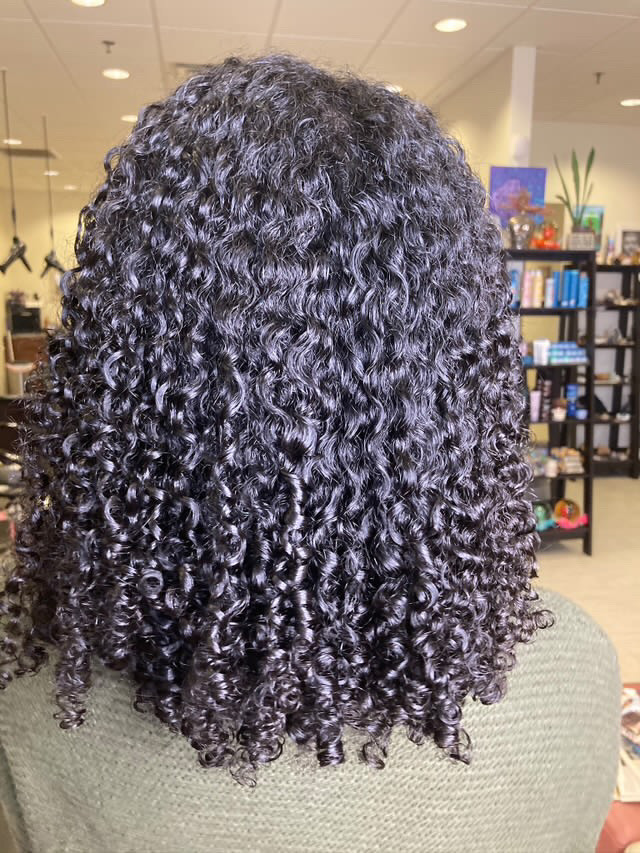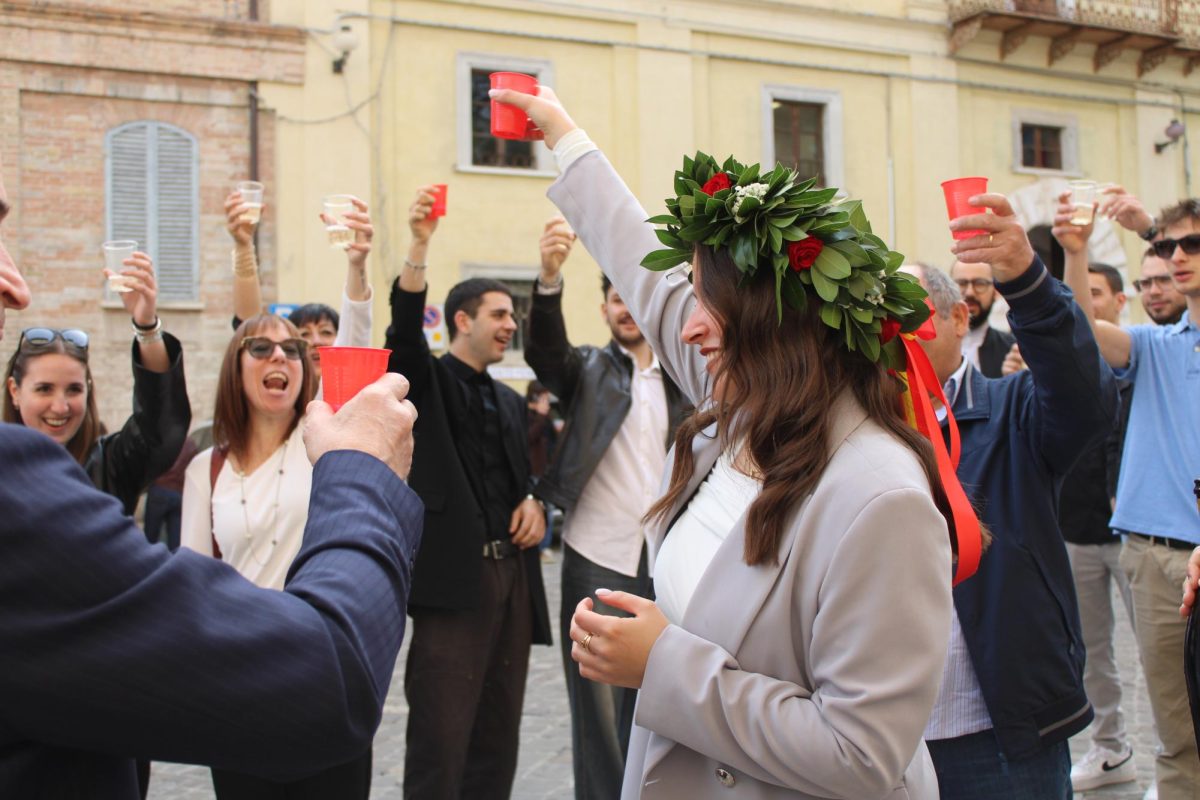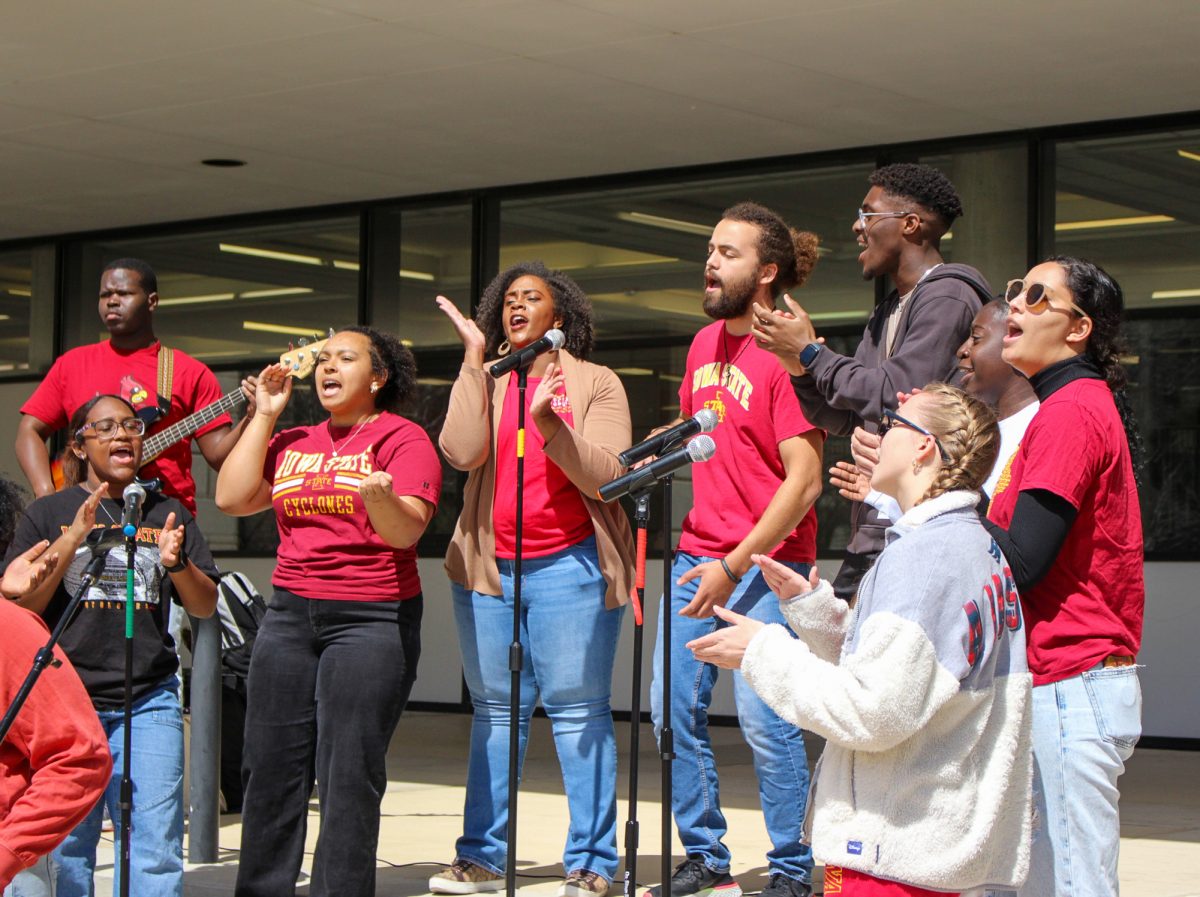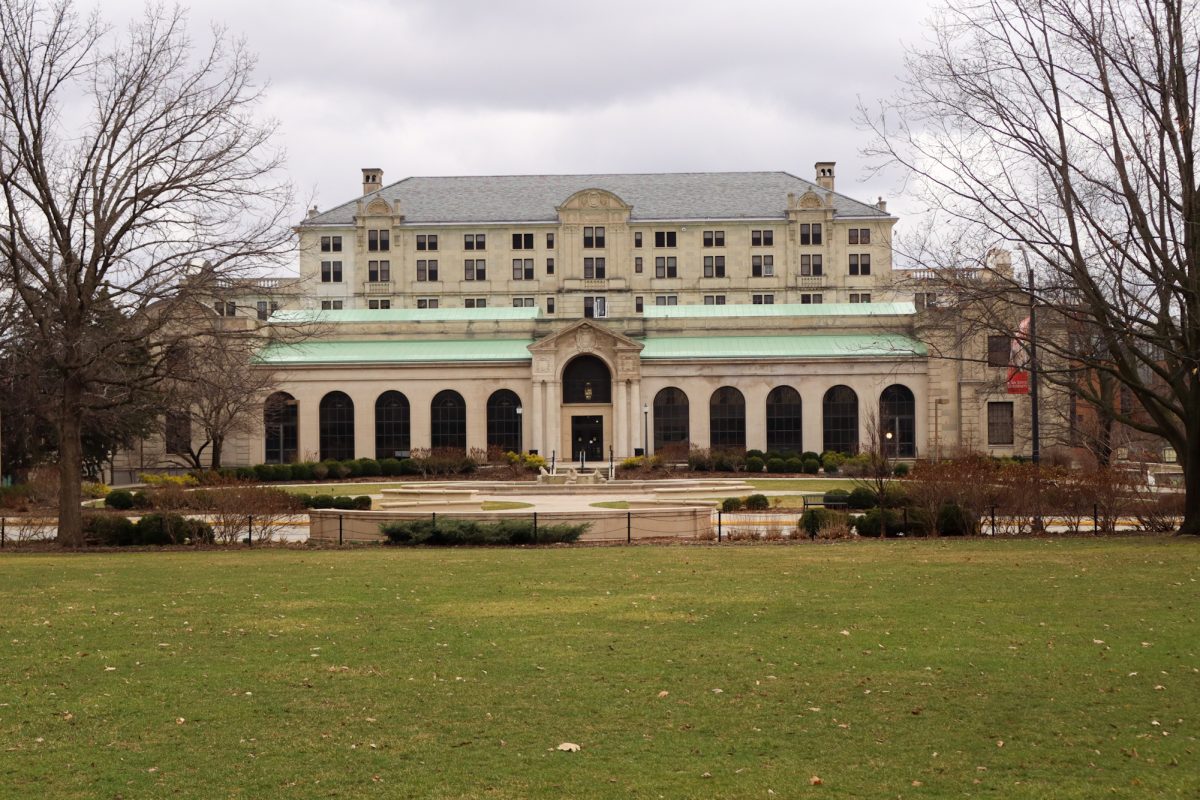As a young level-10 blonde, self-described as having “picture-perfect” hair, Lara Murray, an Ames native and cosmetology student at PCI Academy, recalled having a strong urge to experiment with their hairstyle and self-expression.
“Everyone always told me no,” Murray said. “They always told me no. And people, friends and family, anytime I wanted to do something with my hair, people said ‘No, why would you do that?’ It was like, ‘I want to color it now, I like your blonde hair. I want to chop it. No, but I like your long hair,’ stuff like that.”
Murray said they were self-conscious and needed someone to say, “let’s cut it, that would look good on you.”
I didn’t know that I was non-binary, and so I was always stuck in this feminine body that wasn’t mine,” Murray said. “And nobody had ever told me, well, a short haircut would look really good, a masculine-looking haircut, that would look really good on you.”
As Murray got older, they experimented with various hairstyles and a more-than-once shaved head, saying each style made them feel more like themselves.
“It wasn’t about the hair anymore,” Murray said. “When I detached that sense of worth from my hair, I – all of a sudden – started becoming myself. I started trying new things. I started experimenting with my gender, I started looking at myself and liking my face for the first time ever.”
As a stylist, Murray aims to show their clients open-mindedness and willingness to learn what they wished for in the past. Murray said they seek to show clients the vision of a different version of themselves and establish mutual trust through artistic and self-expression.
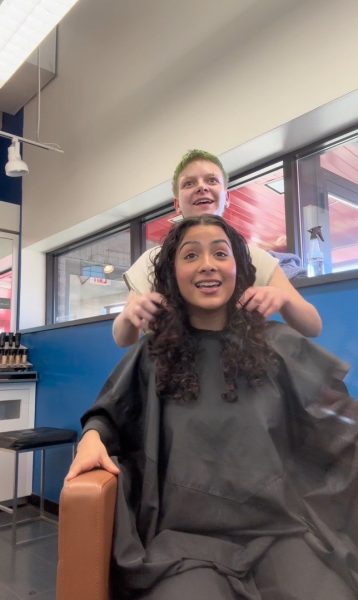
“Don’t you wish that you had yourself as a stylist?” Murray said. “I can become that for other people. I can be that person that they sit in the chair, the people that have hair anxiety, the people that have hair trauma, they can feel comfortable and reassured the whole time.”
Jassma’ray Johnson, a 2023 Iowa State alumna and former PCI massage therapy student, said Murray often complimented her hair while in school. The two bonded over their individual goals as students and supported each other’s work.
Johnson said Murray is always receptive to feedback and pays attention to detail and gives their clients autonomy over hair decisions while politely providing information, expertise and input.
“I am African American and Lara never overstepped, but did a great job of active listening and learning to better serve me as a client,” Johnson said. “I felt heard, and I love that they even go out of their way to learn about diverse textures and wanting to be of service to that community.”
Johnson said the availability of hair care in Ames for textured and African American hair is so scarce she has to go to Des Moines for services. Johnson said Black hair stylists or products are rarely available, and information surrounding Black hair is left out of the PCI curriculum.
“Our hair is excluded; I understand the vast majority in Ames is of another race, but it’s important to learn all people and how to care for their hair as a stylist in order to connect, grow and truly be of service to all,” Johnson said. “I know Pure Luxe Salon and Spa in Ames is Black-owned and they are working to change that narrative, but we need more on board.”
Terri Ford, the owner and founder of Pure Luxe, said it was a shame curly, textured and kinky hair care is often left out of the curriculum.
“It was only recently mandated in New York, so imagine all the students that are going to beauty schools, and then they get out in the real world and they have no experience unless somebody came to their school,” Ford said. “It’s a shame really. It’s actually quite, quite evil that you don’t even take the time to teach about a whole chunk of your society’s demographic.”
Ford said the diversity gap in cosmetic resources is why she opened the salon almost 10 years ago.
“We’ve been open for almost 10 years, so we’ve had 10 years of the textured people in town finding their way to us and us working through things,” Ford said.
When she was let go from an engineering job, Ford said she took it as an opportunity to fill a gap she knew existed.
“How are you going to get a medical degree and don’t know how to take blood or don’t know how to check somebody’s heartbeat?” Ford asked. “It’s that fundamental because most people have some curl of some sort even if it’s very faint, and why wouldn’t you want to be able to assist everybody who will come to your door.”
Moving to a college town, Ford said she would have never suspected there wasn’t a place for curly and textured hair care.
“I moved out here and I got to asking girls, ‘Your hair’s cute, where do you get it done?’, and they’d say, Des Moines, Waterloo, [they’d] gotta go home to St. Louis,” Ford said. “I really couldn’t believe it.”
Ford said she had relaxers done for years, applying a chemical treatment to her textured hair to make it permanently straight.
“When I would go into the salons in town, this was before I knew any better, they would take one look at me, the brown skin girl, and tell me they could not do my hair,” Ford said. “They hadn’t even touched my hair. They hadn’t sat me in a chair. They hadn’t put a comb in my hair. But they just looked at my skin color and said no.”
Ford then decided that someone needed to open up a business where the underserved are acknowledged, appreciated and welcomed, which she said Pure Luxe aims to do.
Pure Luxe also specializes in treating melanated skin and has estheticians specializing in skincare. Ford said the salon works to provide healthy, result-driven options in haircare and skincare because along with the hair, melanated skin is not taught in schools.
“The same skin conditions, the way they present on lighter skin, it doesn’t look the same on darker skin tones,” Ford said. “So an esthetician or skin professional could miss the diagnosis or miss diagnose a skin condition because again, they’ve not been taught it in school.”
This diversity gap, Ford said, was more of a chasm, spreading from one side of the country to the next. At Pure Luxe, Ford said she finds service providers with a willingness to want to learn texture and curls.
“How is a person supposed to get quality skincare if the professionals don’t get the knowledge in school,” Ford said. “They’re forced to get it on the job and learn on the job.”
Murray said they were not going to learn how to do Black hair unless they moved to a salon where all styles and hair types were prioritized. Upon graduating, they will move to Bakersfield, California, to work at Studio Groove Salon, where Murray said stylists do Black hair and learn curly and textured cuts.
“I was like, I can learn that, and if I ever want to come back I can bring that knowledge back or I can come back for new educational classes and teach that stuff in a workshop,” Murray said.
Murray said PCI has already asked them to teach a curly cutting class.
“There’s clientele that need to get their hair done,” Murray said. “Every single time I meet somebody with textured hair, [they get it done] four hours away, or it’s like their little sister or their friend’s sibling or their cousin or whatever. And I was like, I need to prioritize this.”
Tenia Williams, a cosmetologist and hairstylist at Pure Luxe, attended PCI Academy before starting at Pure Luxe in 2019. Williams has been doing her own hair since she was 15 years old.
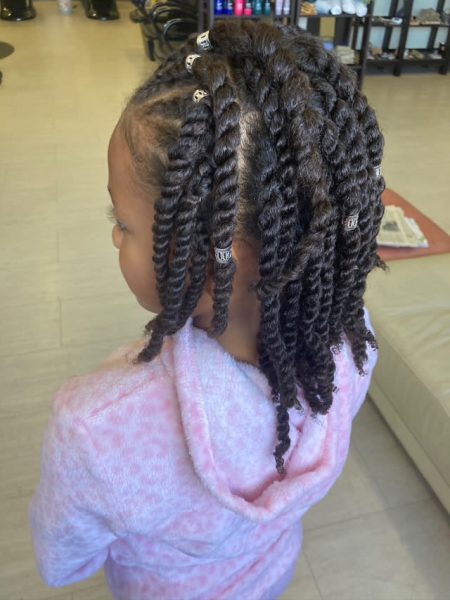
Williams said PCI is not the only school with Black hair care missing from the curriculum.
“What I’ve discovered is that a lot of schools don’t [teach it], unless the demographics show reason to, even though Black stylists have to learn how to do white/caucasian hair regardless where we go,” Williams said. “I and other Black and brown students asked plenty of times about getting someone who understood our hair to come in and teach a class. We didn’t get a response.”
In school, Williams said she was taught how to do blowouts, relaxers and cornrows.
“Anything that had to do with curl really didn’t have a place to thrive; it was called frizzy and needed to be ‘tamed’,” Williams said. “This is the issue of the curriculum, not necessarily the educators because like any teacher, they can only teach you what is required.”
Williams said most of the global population has curls or waves of some kind, including many in the Ames community.
“When you don’t teach about or give the tools to maintain your hair, only ‘tame’ it, you start feeling terrible about the hair that grows from your head,” Williams said. “I had to go through that on my own. I don’t want anyone to go through that, so I make it my mission to guide people through that space and understand their hair is normal, natural and loved.”
While Williams said she does see effort and growth, the Ames and surrounding community is still lacking in resources for Black hair care.
“I’ve graduated with some amazing people that were interested in curly or Black hair during school, to learn about Black hair and curly hair in general and add that to their menu,” Williams said. “Pure Luxe is the only salon in town I know of where we specialize in curly hair, specifically natural.”
Both Johnson and Murray said they see hair as a crucial outlet for self-expression and identity, providing a mode of confidence and self-care that affects all aspects of daily life.
“Hair is everything to me. If my hair isn’t done, I’m not done,” Johnson said. “Hair is a way for people to express themselves in ways that words can not. It allows us freedom and gives us confidence.”
Murray said they have experienced different treatment with each hairstyle, and strive to see things from the perspective of their clientele.
“If I have a buzz cut or if I have a short little red haircut, I get treated so drastically different,” Murray said. “I know what all those changes make to the way you’re perceived by the world, but I also know the crowd that it attracts and draws in if you’ve been in the shoes of your clients and [their] hairstyles, you know how to serve them because you’ve been there.”
Ford said her hair is a representation of herself, and the goal of Pure Luxe is to help people fall back in love with their natural hair.
“Especially that I’m a texture girl, we know we can wear our hair in different styles every day if we want to, braided loose, sanded up top and an afro flick to the back,” Ford said. “So depending on our mood, that sometimes helps us pick a style for the day. And if it’s your hair, we look at it as our crowns, and so it’s the first thing people notice.”


